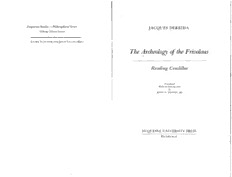
The Archeology of the Frivolous: Reading Condillac PDF
74 Pages·1980·1.651 MB·English
Most books are stored in the elastic cloud where traffic is expensive. For this reason, we have a limit on daily download.
Preview The Archeology of the Frivolous: Reading Condillac
Description:
In 1746 the French philosophe Condillac published his Essay on the Origin of Human Knowledge, one of many attempts during the century to determine how we organize and validate ideas as knowledge. In investigating language, especially written language, he found not only the seriousness he sought but also a great deal of frivolity whose relation to the sober business of philosophy had to be addressed somehow. If the mind truly reflects the world, and language reflects the mind, why is there so much error and nonsense? Whence the distortions? How can they be remedied?In The Archeology of the Frivolous, Jacques Derrida recoups Condillac's enterprise, showing how it anticipated--consciously or not--many of the issues that have since stymied epistemology and linguistic philosophy. If anyone doubts that deconstruction can be a powerful analytic method, try this.
See more
The list of books you might like
Most books are stored in the elastic cloud where traffic is expensive. For this reason, we have a limit on daily download.
